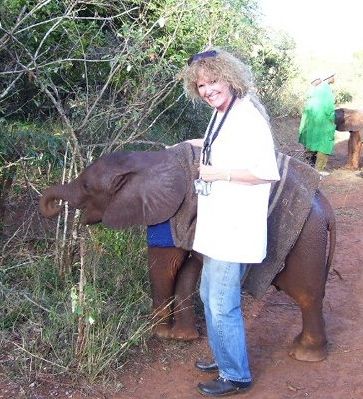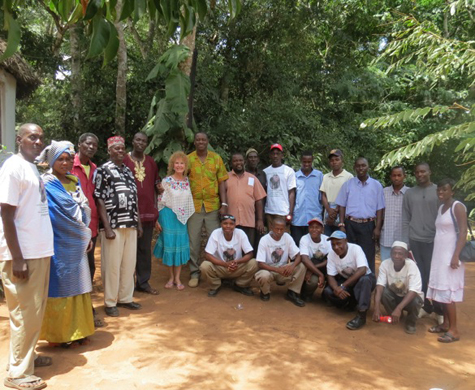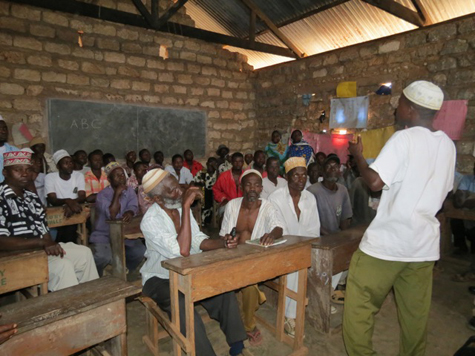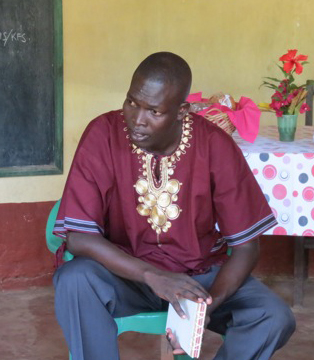 |
 |
|
Our Projects include: |
 |
Our Many Projects in Kenya
Meet Our Kenya Team!

Photo Shows
our 15 Employees, Village Chiefs and Kenya Wildlife Service Wardens
Pachyderm Power!'s pivotal work in Kenya, to save the African elephant, confronts all the issues threatening elephants' survival, namely: poaching, hunting, human / elephant conflict, drought, loss of habitat, poverty and famine. Our sustainability projects include an anti-poaching patrol led by local tribesmen; rural presentations inspiring conservation; water saving methods combating drought; working with subsistence farmers to increase their crop yield and eco-tourism benefiting both elephant and villager. We do our work from the elephants' point of view - keeping them wild and free.
Our School Presentations Teach the Importance of Saving Elephants...

Many African children (in fact, 85%) have never seen an elephant! The stories and video we show them is new information to them. They are amazed and enchanted to hear heart felt stories of the beauty and wonder of elephants. Poachers come from the soil of Africa, therefore these presentations are essential to create future conservationists instead of poachers.
Meeting with Farmers to Resolve Human / Elephant Conflict Issues...

The man at the front is a PP! employee. We are discussing with this group of subsistence farmers how our team of patrolmen can keep elephants from eating their crops. This saves elephants because farmers won't have a reason to kill the elephants. In addition to protecting vulnerable crops at night by chasing elephants away, we are also exploring and developing other "tools". Namely: bee hives (elephants don't like bees... imagine having a bee go up their long nose), chili peppers as deterrents and alternative crops that elephants don't like to eat. Presently we have bought 620 tree seedlings that are being planted by the local farmers to create a barrier between the elephants and their crops. We are intending to also use these trees, which the eles don't like, to provide shade for them but which they won't eat.
We
are Fortunate to have the Support and Collaboration
of the
Kenya Wildlife Service...
 Mohamed Kheri, Senior Warden |
 Philemon Chebet, Community Warden |
The Kenya Wildlife Service is the government agency which has the mandate to protect the wildlife of Kenya. They are incredibly busy, understaffed and underfunded. So we are very lucky to have their time, attention and support. We meet with them on a regular basis and work collaboratively to create harmony between the elephants, villagers and farmers. One of the projects that we are working on with them is getting a source of water to farmers who only depend on rain to water their crops. In a country of long periods of drought, waiting for and depending on rain only, can be a disaster. With a reliable water source in place, simple irrigation systems (called Kick Start) can double the yield of the crops, bringing them out of poverty.
Simple Irrigation Pumps...

The projects that we are doing in Kenya are Pilot Projects with the intention of spreading them to all areas where elephants are threatened. We welcome your support and investment in creating a future for elephants, free of abuse, poaching and extinction.
Please read article below by Dan Simpson, former ambassador to Africa, to get an idea of the extermination of elephants occurring on the African continent. We at Pachyderm Power! will never give up our efforts to do all we can to stop it. Join us!
To Partner with Us to Save the African Elephant, click HERE
Elephants Are On Their Way To Extinction
These majestic animals
are being slaughtered to
feed the Chinese ivory market
By Dan Simpson, Pittsburgh Post-Gazette
July 27, 2011
The long and short of it is that, in spite of a well-meaning and fairly organized effort over the past few decades, the world's African elephants in the wild are being systematically exterminated.
The cause is a combination of growing wealth and a taste for ivory in China coupled with fecklessness and greed on the part of Africans who host and are supposed to protect the elephants.
The bottom line for Americans is that, given the likelihood that efforts to save the elephants will not succeed, the best thing to do is go to Africa and visit them while they are still around.
The most recent layout of the situation is contained in a masterful piece of journalism executed by Vanity Fair editor Alex Shoumatoff -- after a six-week, nine-country investigation -- entitled "Agony and Ivory" in the August issue of the magazine.
I should say, for purposes of "truth in advertising," that I have had a soft spot for elephants for 50 years. I first ran into them outside of a zoo as a teacher in Nigeria in 1961. My students turned up one morning with the alarming news that a rogue elephant was running loose in a nearby village, destroying houses and fields, and that some brave hunters were going to have to kill it.
Since then I have seen elephants in the wild in Kenya, Tanzania, Zimbabwe and especially in the Central African Republic, which is featured at some length in the Vanity Fair piece. I've also ridden a tame one in Thailand.
Elephants are very endearing, although one should not get too close to them and definitely should not anger one. They run in extended families -- like modern Americans -- and can live past 65. They demonstrate a whole range of emotions, including sorrow, and those who study them are still trying to figure the many ways they communicate.
Mr. Shoumatoff reports that elephants are well on their way to extinction. They are being killed at the rate of 100 per day, 36,500 per year, for their ivory tusks. In 1970 there were an estimated 1.3 million elephants in Africa. That number now may be down to as low as 400,000.
African elephants still exist in some 37 countries, principally in the Central African Republic, Chad, Ethiopia, Gabon, Kenya, Mali, Sierra Leone, South Africa, Tanzania, Zambia and Zimbabwe. They are protected with varying degrees of effectiveness and honesty. To make the other side of the argument, it is worth noting that unemployment in Zimbabwe, for example, stands at 80 percent, so people need sources of income.
Various international agreements, in principle, protect elephants and other endangered species. The best known is the Convention for International Trade in Endangered Species of Wild Fauna and Flora. Another is the International Fund for Animal Welfare. They may be international, but they depend for enforcement on the governments of the countries where the animals are found.
Some countries do better than others. Kenya banned hunting in 1977 and the sale of ivory in 1989. Kenya shoots poachers. Sports hunting and culling are permitted in some countries.
But the real problem is only in part at the supply end. On the demand end is a rapidly expanding population of prosperous Chinese who like to display ivory carvings and tusks as evidence of their new wealth. There are an estimated 100 master ivory carvers in the city of Guangzhou alone, says Mr. Shoutmatoff. Markets for ivory also exist in Vietnam, South Korea, Hong Kong and Macau. Chinese dealers are supplied in part by an estimated 1 million Chinese now living and working in Africa.
My own experience in the Central African Republic was that there had to be some means of persuading both the authorities and hunters in Africa that elephants are worth more to them alive than dead. (The same logic applies to forest gorillas, also at risk, but as meat, not body-part trophies.)
Kenya and South Africa have been best at grasping that picture, with Tanzania and Zambia not far behind, having devoted resources to protecting their animals and developing their tourist industries as money-earners and employers.
In countries where government has more or less broken down, such as in the Democratic Republic of the Congo and Zimbabwe, the animal population has perforce virtually been written off. Gabon is advancing into that category and has now reportedly become a major source of tusks.
African governments prepared to wade into the swift, dangerous river of drug and arms dealing, money-laundering and organized ivory exporting are not numerous. It is all too easy for African leaders to take the short-term gain or bribe that comes from the ivory trader and forgo the more difficult path of working in the long-term interests of his people by preserving this very honorable animal.
If you want to help, probably the best thing you can do is support the tourism industry in one of these countries by visiting the elephants, and, while there, figure out how to help on a longer-term basis. Otherwise, like so many other things we are told about but that no longer exist, the elephants simply won't be there for our children and grandchildren.
Dan Simpson, a former U.S. ambassador who served the State Department for many years in Africa, is a Post-Gazette associate editor ([email protected], 412 263-1976).

Kristal Parks, M.A.
[email protected]
303-571-0801